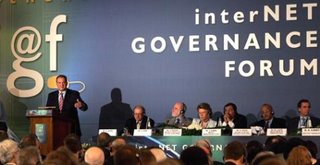
Today is wrap-up day at the
Internet Governance Forum. I've been following and trying to participate in the forum via the
official and
IGF community websites, with mixed results (as
I blogged yesterday, the site has been up and down, and I only got a few questions to the floor). The chair is summing up the results right now, so why don't I take this opportunity to highlight a few memorable events and moments.
First things first: any international forum at which a senior Microsoft executive
admits that perhaps it is time to pack up and leave China must be considered successful.
Fred Tipson is quoted on the BBC website as saying that "[t]hings are getting bad ... and perhaps we have to look again at our presence there ... We have to decide if the persecuting of bloggers reaches a point that it's unacceptable to do business there ... We try to define those levels and the trends are not good there at the moment ... It's a moving target." This on the heels of a highly critical
Human Rights Watch report - which however distinguished between the apparently relatively considerate efforts of Microsoft and Google on the one hand, and the
'complete sell-out' of Yahoo! on the other - and
governmental efforts in the west to outlaw corporate involvement in censorship abroad.
And, credit where credit's due, the Forum has successfully brought together a
truly disparate group of business, government and civil society representatives in an on-going forum for discussion on a huge range of issues relevant to internet governance. So the objective of creating '
dynamic coalitions' may well have been achieved. I hope some of the momentum created in Athens will be carried forward and implemented through concrete action, for example by Microsoft and co. taking their responsibilities a bit more seriously and
staying out of the business of censorship.
But did it achieve enough? Well, yes and no. No because it didn't actually do anything. And no because many of the sessions (workshops and main) rehashed old themes of access and content restrictions, how bad China is (although the governmental rep saying "
we do not have restriction at all" was pretty hilarious - more discussion of that
here and
here), that corporates should not get involved in censorship and how much child porn and porn generally there is on the net. No new themes came up, no new approaches to break the eternal deadlock appeared. Pessimists might say that it was all a big role play: civil society played its part by criticising censorship, the corporates played theirs by denying any really serious complicity in human rights abuses, and
China said that any restrictions imposed were to protect the tourists (okay, so I hadn't heard that one before!). But the IGF does not actually have the power to make any binding decisions (other than deciding that their
next meeting will be at Copacabana beach) and it is probably unfair to expect it to solve anything overnight. So to criticise it for not 'doing' anything would be unfair. I'm an optimist and I declare that something has been achieved. People were brought together and ideas were shared. Microsoft and Cisco sat around the table with Amnesty and ARTICLE 19. A commitment to carry forward this discussion over the next couple of years was made. And - as I said at the start of this post - the corporates moved a step closer to admitting that perhaps they need to look at their involvement in internet censorship again. Now that's actually fairly important.





